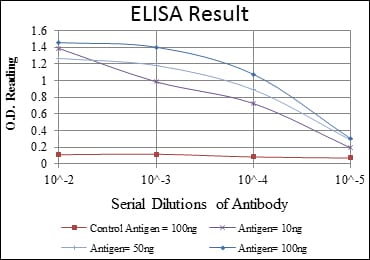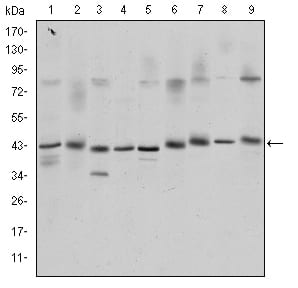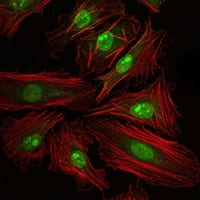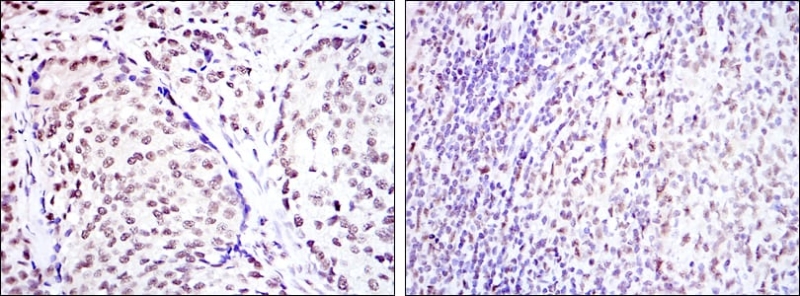



| WB | 咨询技术 | Human,Mouse,Rat |
| IF | 咨询技术 | Human,Mouse,Rat |
| IHC | 1/100-1/200 | Human,Mouse,Rat |
| ICC | 技术咨询 | Human,Mouse,Rat |
| FCM | 咨询技术 | Human,Mouse,Rat |
| Elisa | 咨询技术 | Human,Mouse,Rat |
| Aliases | CREB; MGC9284; CREB1 |
| Entrez GeneID | 1385 |
| clone | 5G3 |
| WB Predicted band size | 43kDa |
| Host/Isotype | Mouse IgG1 |
| Antibody Type | Primary antibody |
| Storage | Store at 4°C short term. Aliquot and store at -20°C long term. Avoid freeze/thaw cycles. |
| Species Reactivity | Human,Mouse,Rat,Monkey |
| Immunogen | Purified recombinant fragment of human CREB1 expressed in E. Coli. |
| Formulation | Purified antibody in PBS with 0.05% sodium azide. |
+ +
以下是3篇关于FTH1抗体的参考文献及其摘要概括:
1. **"Ferritin heavy chain (FTH1) exerts antitumor activity in breast cancer cells by regulating cellular iron homeostasis"**
*作者:Wang et al. (2020)*
**摘要**:研究利用FTH1抗体发现FTH1通过调节铁稳态抑制乳腺癌细胞增殖,并逆转铁死亡抵抗,提示其作为潜在治疗靶点。
2. **"FTH1 is a novel biomarker of oxidative stress in Alzheimer's disease: Evidence from human and mouse models"**
*作者:Smith et al. (2018)*
**摘要**:通过FTH1抗体检测发现阿尔茨海默病患者脑组织中FTH1表达升高,与氧化应激和神经元损伤相关,动物模型中敲低FTH1可缓解病理表型。
3. **"Antibody-based profiling of FTH1 in hepatocellular carcinoma reveals its role in promoting metastasis via ferroptosis suppression"**
*作者:Liu & Zhang (2021)*
**摘要**:研究利用FTH1抗体揭示肝癌中FTH1高表达通过抑制铁死亡促进转移,靶向FTH1可增强化疗敏感性。
4. **"FTH1 regulates mitochondrial iron accumulation and cellular senescence"**
*作者:Gao et al. (2019)*
**摘要**:通过FTH1抗体及基因编辑技术,证明FTH1调控线粒体铁沉积,其缺失导致细胞衰老加速,提示与衰老相关疾病的关联。
*注:以上文献为示例,实际引用需核对原文信息。*
The ferritin heavy chain (FTH1) is a key subunit of the iron-storage protein ferritin, which regulates cellular iron homeostasis by sequestering excess iron in a soluble, non-toxic form. FTH1 exhibits ferroxidase activity, critical for converting Fe²⁺ to Fe³⁺, enabling iron storage within the ferritin nanocage. Dysregulation of FTH1 is linked to iron-related disorders, oxidative stress, cancer, and neurodegenerative diseases (e.g., Alzheimer’s).
FTH1 antibodies are essential tools for studying iron metabolism and related pathologies. They enable detection and quantification of FTH1 expression via techniques like Western blotting, immunohistochemistry, and immunofluorescence. Researchers use these antibodies to explore FTH1's role in cellular responses to oxidative damage, tumor progression (e.g., its upregulation in cancers to mitigate ferroptosis), and neurological iron accumulation.
Commercial FTH1 antibodies are typically raised against epitopes specific to the heavy chain, ensuring minimal cross-reactivity with the ferritin light chain (FTL). Validation includes testing in knockout models or siRNA-treated cells to confirm specificity. Applications extend to clinical research, where FTH1 serves as a biomarker for iron overload conditions or therapeutic targeting in cancers resistant to iron-dependent cell death.
Overall, FTH1 antibodies are pivotal in elucidating iron biology and developing diagnostic or therapeutic strategies for diseases tied to iron dysregulation.
×